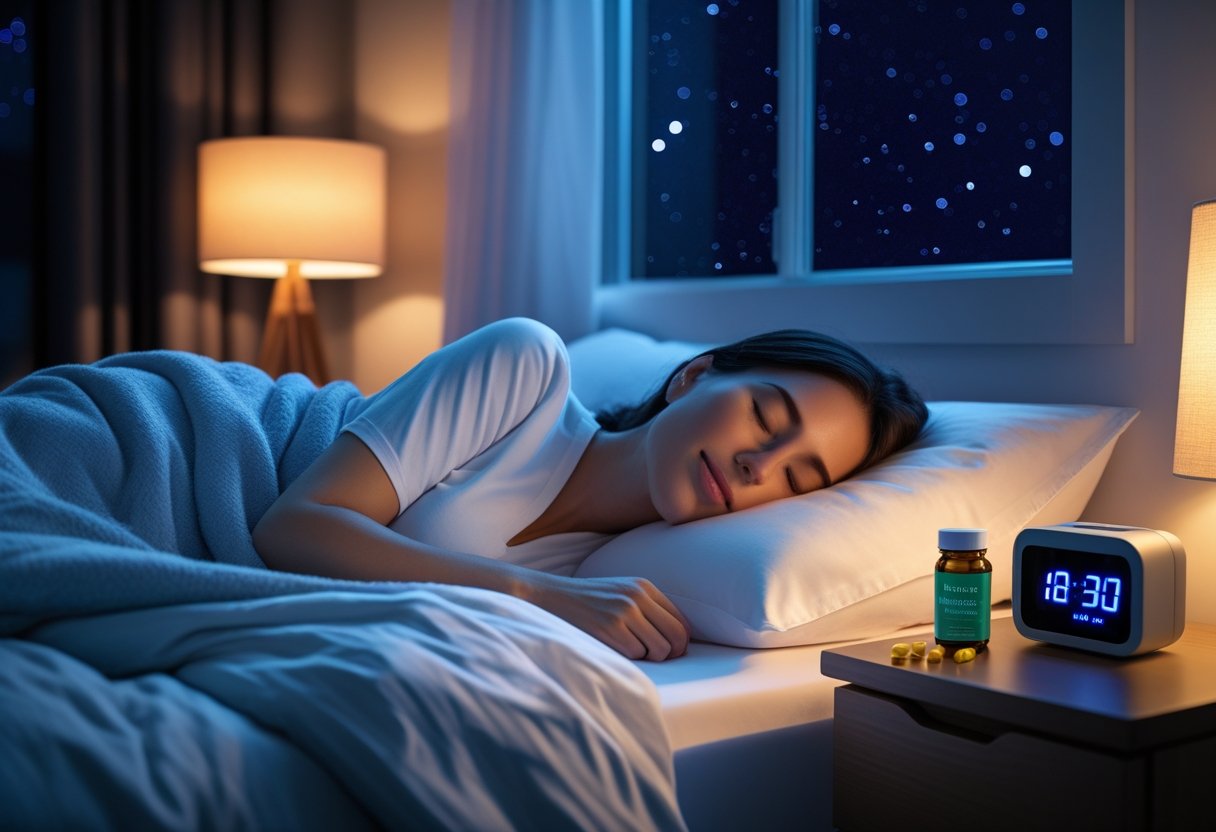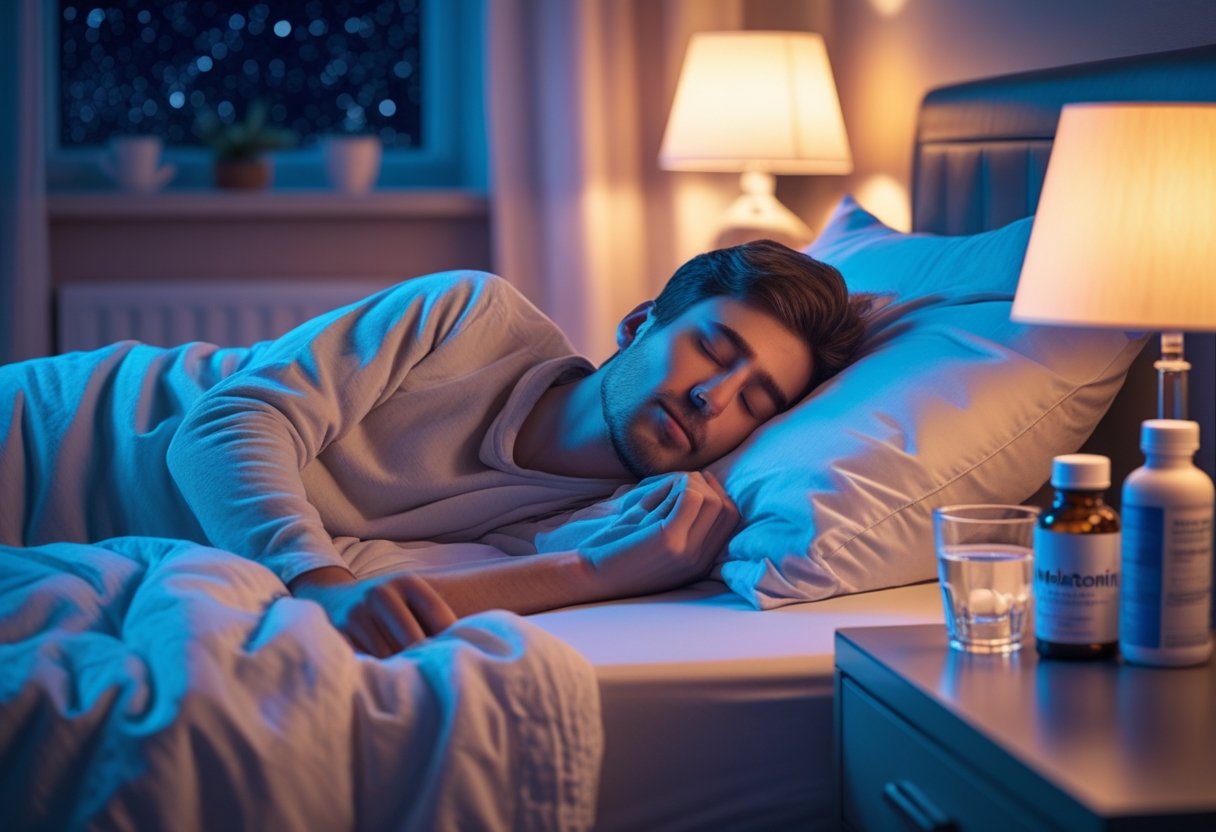Many people struggle with falling asleep or staying asleep through the night. Melatonin, a hormone naturally produced by the body, plays a key role in regulating the sleep-wake cycle. Taking melatonin supplements can help improve sleep quality by signaling the body that it is time to rest.

Melatonin is often used to manage issues like jet lag, shift work sleep problems, and general insomnia. It works best when used at the right time and in the right dosage, helping the body adjust its internal clock. Understanding how melatonin affects sleep can help people decide if it’s the right option for them.
Table of Contents
Understanding Melatonin

Melatonin plays a key role in controlling sleep cycles. It is a natural chemical in the body that helps signal when it is time to rest. Its production and function work closely with environmental cues like light and darkness.
What Is Melatonin
Melatonin is a hormone produced mainly by the pineal gland in the brain. It acts as a signal for the body to prepare for sleep. The hormone levels rise in the evening as it gets dark and fall in the morning when light returns.
Melatonin supplements are often used to help with sleep problems, but they mimic the natural hormone rather than replacing a missing substance. The amount produced and released can vary from person to person.
How Melatonin Regulates Sleep
Melatonin controls the body’s internal clock, known as the circadian rhythm. It tells the brain it is nighttime, encouraging feelings of sleepiness. This helps people fall asleep more easily and maintain regular sleep patterns.
When melatonin levels rise, body temperature drops, and certain brain waves begin to slow down, all of which support sleep. If melatonin is low or disrupted, it can cause trouble with falling asleep or staying asleep.
Natural Production in the Body
The body starts making melatonin when the eyes detect less light. Darkness triggers the pineal gland to increase melatonin production. When exposed to light, especially blue light from screens, melatonin production can be suppressed.
Melatonin levels usually peak late at night and decrease towards morning. Age, lifestyle habits, and some medical conditions can affect how much melatonin the body produces naturally.
Benefits of Using Melatonin for Sleep

Melatonin helps regulate the sleep cycle in specific ways. It can help people fall asleep faster, improve how deeply they sleep, and adjust their internal body clocks.
Improved Sleep Onset
Melatonin is known for reducing the time it takes to fall asleep. It signals to the brain that it is time to rest, which helps induce sleepiness. People who have trouble falling asleep often find melatonin useful because it can shorten the delay between going to bed and actually sleeping.
This effect is especially helpful for those with insomnia or delayed sleep phase syndrome. Taking melatonin supplements about 30 to 60 minutes before bedtime is common, as it fits well with the natural rise of melatonin levels in the body. It can also lower the time spent awake during the night.
Enhancement of Sleep Quality
Melatonin can improve sleep quality by increasing the amount of deep, restorative sleep. This phase is crucial for memory, learning, and physical health. When melatonin levels are balanced, people tend to have fewer disruptions and experience more restful sleep.
Studies show that melatonin may reduce waking up during the night and help with overall sleep efficiency. It is not a sedative but helps the body maintain a natural, healthy sleep pattern. This is important for those who struggle with poor-quality sleep or frequent awakenings.
Adjusting Circadian Rhythms
Melatonin plays a key role in resetting the body’s internal clock. This is important for people whose sleep schedules are out of sync, such as shift workers or travelers with jet lag. Melatonin supplements can help align sleep times with day and night cycles.
Using melatonin at specific times can shift the circadian rhythm earlier or later, helping people adapt to new sleep schedules. For example, it is often used to combat the effects of crossing time zones and improve sleep patterns for those with irregular routines. Timing and dosage matter to achieve the best effect.
Proper Dosage and Timing

Melatonin works best when taken in the right dose and at the right time. Taking too much or at the wrong time can reduce its effectiveness or cause side effects. Understanding these details can help improve sleep quality without risks.
Recommended Dosages
The usual dose for adults ranges between 0.5 mg to 5 mg per night. Starting with a low dose, like 0.5 to 1 mg, is often advised to see how the body reacts. Higher doses are not always better and can sometimes cause headaches or dizziness.
For older adults, lower doses are generally recommended because their sensitivity to melatonin can be higher. Children and teenagers should only take melatonin under medical supervision.
A typical dosing table:
| Age Group | Typical Dose | Notes |
|---|---|---|
| Adults | 0.5 mg – 5 mg | Start low, increase if needed |
| Older Adults | 0.3 mg – 2 mg | May be more sensitive |
| Children/Teens | Under doctor advice | Avoid without guidance |
Optimal Timing for Taking Melatonin
Timing depends on the sleep goal. Most people should take melatonin 30 to 60 minutes before bedtime. This allows the hormone to signal the body to prepare for sleep.
For those flying across time zones, melatonin is best taken at the target bedtime in the new time zone. This helps reset the body’s internal clock.
Taking melatonin too early or too late can confuse the body’s natural rhythms. Avoid taking it in the middle of the night unless recommended by a healthcare provider.
Using Melatonin for Specific Sleep Issues
Melatonin can help people with different sleep problems by adjusting the body’s internal clock. It works best when used at the right time and dosage for each condition. Understanding how melatonin affects these issues helps users get better results.
Insomnia and Sleep Disorders
For people with insomnia, melatonin may improve the time it takes to fall asleep. It is not a strong sedative but can help signal to the brain that it is time to sleep. Taking melatonin about 30 to 60 minutes before bedtime tends to work best.
Melatonin might also help with other sleep disorders like delayed sleep or difficulty staying asleep. The usual dosage ranges from 0.5 mg to 5 mg, depending on the severity and individual response. It’s important to avoid using it too late at night, as this can disrupt sleep patterns.
Jet Lag and Shift Work
Melatonin helps reset the internal clock when travelers cross time zones. Taking melatonin close to the target bedtime at the destination can reduce jet lag symptoms. It’s often recommended to start melatonin a day before travel and continue for a few days after arrival.
For shift workers, melatonin can assist in adjusting to irregular sleep schedules. Taking melatonin before the desired sleep time improves daytime or irregular sleep quality. Consistent timing and dosage, typically 1 to 3 mg, are important for better adaptation.
Delayed Sleep Phase Syndrome
Delayed Sleep Phase Syndrome causes people to fall asleep very late and wake up late. Melatonin can shift the sleep cycle earlier when taken a few hours before the intended bedtime. This helps align sleep with normal daytime activities.
Timing is critical: melatonin should be taken at least 3 hours before the natural sleep time. Lower doses, like 0.3 to 1 mg, are often effective and avoid side effects. Consistency over several weeks may be needed for lasting improvement.
Safety and Side Effects
Is generally safe when used as directed but can cause side effects and interact with some medications. Certain people may face higher risks or should avoid melatonin altogether. Understanding these factors helps ensure safe use.
Potential Risks
Melatonin can cause mild side effects like headache, dizziness, and nausea. Some users report feeling groggy or experiencing vivid dreams. These effects usually occur at higher doses or with long-term use.
In rare cases, melatonin may affect blood pressure or hormone levels, especially if taken in large amounts. Overuse might disrupt the body’s natural sleep cycle rather than improve it.
People should avoid taking melatonin for extended periods without medical advice. Monitoring for side effects is important, especially when first starting supplements.
Interactions with Medications
Melatonin can interact with drugs that affect the nervous system, like sedatives or antidepressants. These combinations may increase drowsiness or cause unusual side effects.
It can also interact with blood thinners, such as warfarin, potentially raising the risk of bleeding. Melatonin may affect blood sugar levels, so those on diabetes medication should be cautious.
Always consult a healthcare provider before combining melatonin with any prescription or over-the-counter medications to avoid harmful interactions.
Who Should Avoid Melatonin
Children and teenagers generally should avoid melatonin unless prescribed by a doctor, as its effects on developing bodies are not fully known. Pregnant and breastfeeding women should also avoid melatonin due to limited safety data.
People with autoimmune diseases or epilepsy should be cautious, as melatonin might worsen symptoms. Individuals with severe liver or kidney problems should consult a doctor before use.
Anyone unsure about melatonin’s safety, especially those with chronic health issues, should seek medical advice before starting supplementation.
Natural Ways to Support Sleep Alongside Melatonin
Improving sleep involves specific habits and changes in daily routines. These actions help the body relax and align with natural sleep cycles. Simple adjustments can work well with melatonin to promote better rest.
Healthy Sleep Hygiene
Establishing a consistent sleep schedule is essential. Going to bed and waking up at the same time every day helps regulate the body’s internal clock.
Limiting screen time before bed is also important. Blue light from phones and computers can interfere with melatonin production.
Creating a calming bedtime routine signals the body to prepare for sleep. Activities like reading or gentle stretching can ease the transition.
Avoid heavy meals, caffeine, and alcohol close to bedtime. These can disrupt sleep quality.
Keeping the bedroom quiet, dark, and cool supports deeper rest. Using blackout curtains and white noise machines can help achieve ideal conditions.
Lifestyle and Environmental Adjustments
Regular exercise during the day promotes better sleep, but vigorous activity right before bed is not recommended.
Exposure to natural sunlight in the morning helps set the sleep-wake cycle. Spending at least 20 minutes outside daily can improve alertness and sleep quality.
Reducing stress through mindfulness, meditation, or breathing exercises can lower restlessness at night.
Limiting naps, especially in the late afternoon, prevents difficulty falling asleep at night.
Organizing the sleep space to remove distractions ensures the environment is dedicated to rest and recovery.
Myths and Misconceptions About Melatonin
Many people think melatonin is a sleeping pill like any other. It is not a sedative but a hormone that helps regulate the sleep-wake cycle.
Some believe melatonin works immediately to knock you out. In truth, it helps signal your body that it’s time to sleep, but it may take some time to feel its effects.
There is a misconception that melatonin is safe to use in any amount. While it is generally safe in low doses, taking too much can cause side effects like dizziness or headaches.
People often think melatonin is addictive. Research shows it is not addictive and does not cause dependence.
Another incorrect idea is that it works the same for everyone. Its effectiveness can vary depending on age, health, and why someone is taking it.
| Myth | Fact |
|---|---|
| Melatonin is a sleeping pill | It is a hormone that signals sleep timing |
| Works instantly | Effects may take time to appear |
| Safe in any dose | High doses can cause side effects |
| Causes addiction | It is not addictive |
| Works the same for all | Results vary by individual and condition |

1 comentário em “As Sleep Better With-Melatonin: Effective Tips for Improving Your Rest”